Topic: Abortion
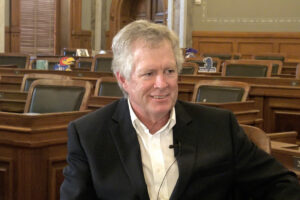
Interview of Dennis McKinney, August 23, 2019
Interviewed by Dale Goter
Dennis McKinney developed many insights in his sixteen years as a leader in the minority party into how the legislature did work, and how it should work. He recounts numerous instances when things worked well because of bipartisan cooperation and compromise. McKinney's experiences on the House Energy and Natural Resources committee working with Carl Holmes and Ken Grotewiel helped shape water policy in Kansas. His experience as a farmer and rancher in south central Kansas coupled with his focus on problem solving led to his reputation as a "middle of the road legislator" who would work Show Morewith both political sides as well as urban and rural. McKinney was committed to public education as well as conservation. The pursuit of fair and balanced tax policy shaped his actions. The interview highlights the importance of leadership from the governor's office and other legislative leaders (Mays, Shallenburger, D. Kerr, Morris). There is an interesting segment about the 2005 Special Session on school finance where McKinney talks about using the courts as leverage. The interview concludes with a brief discussion of the Greensburg tornado. Show Less

Interview of Robert (Bob) Miller, November 9, 2017
Interviewed by H. Edward (Ed) Flentje
Former Speaker of the Kansas House of Representatives, Robert (Bob) Miller recalls his many years of service to the State. He describes his involvement with the Young Republicans at K-State, his first campaign to represent his area of Sumner County, and moving up through the ranks in the House despite not having ambition for any other elected position. Miller reflects on his sometimes arms-length relationships with fellow House members and with lobbyists. From his position as chair of the House Federal and State Affairs Committee he oversaw the development of implementing legislation for liquor-by-the-drink, parimutuel wagering, and Show Morethe State Lottery by building subject-matter expertise within the committee. Miller describes instances when legislators' positions on policy issues did not break along purely partisan nor on purely urban-rural lines. He also witnessed the early development of what eventually became the conservative movement in the Legislature.
A version of this interview is also posted on KansasMemory.org, the website of the Kansas Historical Society. Show Less
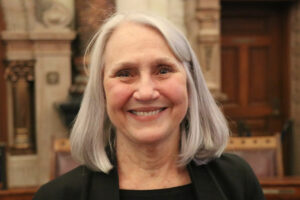
Interview of Nancy Parrish, October 23, 2020
Interviewed by Patty Clark
This 2020 oral history interview of former State Senator Nancy Parrish is packed full of information about people and policy between 1980 and 1992 in the Kansas Senate. She was one of the first, if not the first Democrat women elected to the state senate. Parrish talks about establishing her own identity after filling the unexpired part of her husband's term and winning the seat three more times while fostering a child, adopting a child, and attending law school at Washburn University. Her relationships with Republican senators allowed her to be effective in passing or shaping legislation. Show MoreParrish served on the conference committee to negotiate the 1992 school finance bill. Parrish also discussed her two years as Secretary of Revenue and working with Senator Gus Bogina to pass legislation to provide for purchase of a large-scale computer system for collecting taxes at the Department of Revenue. Parrish offers opinions on the importance of the separation of powers in the constitution, from her perspective as a former legislator, an executive branch administrator and a judge. For Parrish, each of these experiences has been a learning experience. She concludes the interview by expressing concern about the loss of "camaraderie" among legislators. Show Less
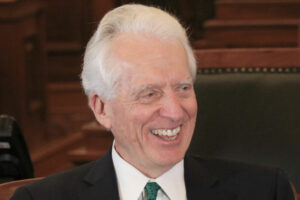
Interview of James (Jim) Slattery, March 6, 2020
Interviewed by Jim McLean
The 1970's marked major changes in state government. They are doing away with county welfare offices and creating the Department of Social and Rehabilitation Services (SRS) Concerns over lack of equalization started with Caldwell school finance case. Transportation is being centralized and modernized with the creation of the Department of Transportation (KDOT). Slattery even introduced legislation to decriminalize small amount of marijuana. Campaign finance reform (post-Watergate) and hiring non-partisan, professional staff for the legislature took hold. Slattery and another new freshman, Mike Hayden support legislation to clean up strip mines and reclaim mined Show Morelands. The first income tax reform was initiated despite the governor's veto. Community corrections is emerging as a good strategy. Slattery describes the role of abortion in civil discourse in this interview, how it started in the Dole/Roy race in 1974, and how it continues to distort the American political system in a significant way. He explains why he ran for Congress as a deficit hawk and talked about some of his Congressional experiences. The interview closes with a story about Tip O'Neil and another about former Speaker Clyde Hill who advised Slattery to be accurate when speaking at the Well of the House. Show Less
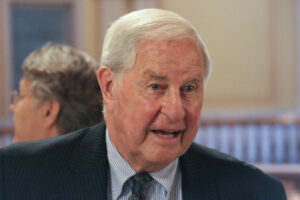
Interview of Robert (Bob) Storey, February 5, 2015
Interviewed by Burdett Loomis
Bob Storey in his 2015 oral history interview recalls his service in the Kansas Senate from 1969-1976. His recollection is of a senate that was in transition in terms of urban-rural influence on policymaking due to the one-person, one-vote principle enunciated by the U.S. Supreme Court in the mid-1960s. He recalls intricacies of interactions among senate leaders and governors and occasional intrigue in senate leadership elections. He also reflects on improvements in the functioning of state government during the years when reorganization and modernization of many state functions took place.
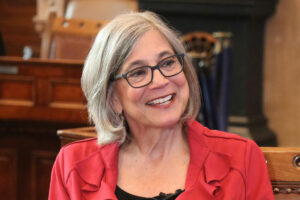
Interview of Susan Wagle, December 18, 2020
Interviewed by Alan Conroy
Former Kansas legislator Susan Wagle describes her interest in politics as "evolving over time." In this interview she candidly talks about her journey to become the first woman to break the glass ceiling and be elected to the top leadership position in the Kansas Senate. And she held onto the Senate Presidency for two terms. Wagle cites several events as having shaped her decision to run: getting a free pregnancy test and learning it was from an abortion clinic; seeing the huge property tax bills resulting from classification and reappraisal and how they angered people; enactment Show Moreof bingo legislation that affected he business negatively--all of which led to awareness that government could have an impact on families and businesses. Once in the Legislature, Wagle developed legislation to control property taxes. When an incumbent left a Senate seat, Wagle moved to the other chamber. She formed alliances in both the House and Senate with a group of conservative legislators enabling her to attain leadership positions. Wagle authored the Woman's Right to Know Act and solicited support from a prochoice Senator to get it passed--the first pro-life legislation. As a committee chair Wagle felt she had greater ability to pass bills that were needed. The issues she addressed ranged from protecting ground water from corporate hog farming, to tax-limiting measures, to ethics. Wagle credits her many years of service to listening to her constituents on issues such as taxation, quality of life, and education. In the closing of this interview, Wagle talks about her last year with COVID which she describes as "horrific" and disruptive. She reflects on her accomplishments changing the Board of Healing Arts and dealing with the Bioscience Authority. Show Less
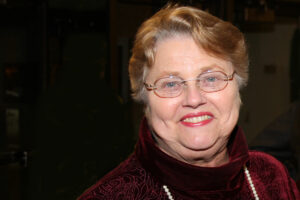
Interview of Joan Wagnon, May 11, 2018
Interviewed by H. Edward (Ed) Flentje
Ed Flentje's interview of former Representative Joan Wagnon is lengthy and complete, covering her 12 years in the state legislature, 4 years as Mayor of Topeka, and 8 years as Secretary of Revenue. She talks about the work of the House Taxation Committee in implementing legislation after passage of a constitutional amendment classifying property for tax purposes. Wagnon discusses the 1992 school finance lawsuit which produced massive change in the school funding formula, including how the concepts were developed and what strategies were used to get them passed. The interview covers in detail how the House Democrats interacted with Show MoreGovernor Finney in the 1991 session, when Finney vetoed the major tax bill and the Supreme Court found the school finance formula to be unconstitutional. Wagnon served as facilitator for the Children's Initiatives Committee which Speaker Marvin Barkis chaired. That committee produced fourteen bills that affected children and families. Economic development issues are discussed in the last part of the interview which links Wagnon's legislative interests to her work as Mayor of Topeka: neighborhood revitalization, spreading the tax base from city to county for Washburn University and the library, and developing economic development infrastructure to attract growth and new business for Topeka. She also discusses some of her eight years as Secretary of Revenue, particularly her involvement with the Streamlined Sales Tax.
A version of this interview is also posted on KansasMemory.org, the website of the Kansas Historical Society. Show Less
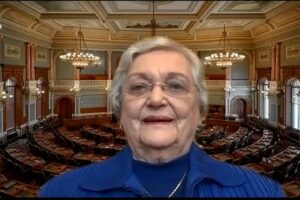
Interview of Ardena Matlack, April 8, 2021
Interviewed by Joan Wagnon
Ardena Matlack describes the Kansas House of Representatives in the 1970’s when so few women were in the Kansas Legislature. Additionally, her second term she experienced being in the majority as a Democrat—something that seldom occurred. While in the majority, she started on the Federal and State Affairs committee as Vice-Chair, and moved up to chair the committee the second year of her term. The committee dealt with the ERA, abortion, liquor and a host of controversial issues. She also served on the Judiciary committee. Her discussion of gerrymandering shows the difficulty in dealing Show Morewith reapportionment that led to her husband losing his Senate seat and encouraging her to run for the House. She also dealt with environmental issues and water issues, particularly in Sedgwick County. Matlack worked with Treasurer Joan Finney to get the first Unclaimed Property law passed. Show Less

Interview of John Solbach, June 11, 2021
Interviewed by Alan Conroy
John Solbach served in the Marines, was wounded in combat in Vietnam, returned to Kansas to finish college and law school and ran for the Kansas legislature in 1978. He represented Lawrence/rural Douglas country in the House for 14 years. Solbach's interview is replete with entertaining stories, starting with his Populist ancestors' takeover of the Kansas House in 1890, to stories about how Mike Hayden helped him get a $4,000 appropriation to bring David Eisenhower to Kansas. He teamed up with Wint Winter Jr. to pass a Uniform Conservation Easement Law in spite of Sen. Ross Doyen; Show More he and R.H. Miller stopped a group of rural electric cooperatives from taking the Wolf Creek Nuclear plant out from under the control of the Kansas Corporation Commission. Solbach considers the sentencing guidelines, passed in 1992 while he chaired the House Judiciary Committee as the best legislation of his career. Show Less
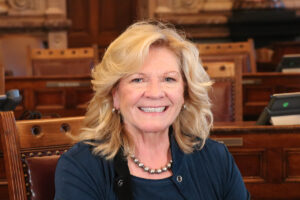
Interview of Jayne Aylward, June 18, 2021
Interviewed by Alan Conroy
Jayne Aylward Oral History Interview describes her experiences as one of the youngest members of the Kansas House of Representatives. Aylward was elected in 1978 from the 74th District in Saline County, Kansas. She served from 1979 to 1990 when she resigned to become an administrative tax judge with the Kansas Board of Tax Appeals. She later became a Certified Public Accountant specializing in tax matters. Aylward is a rancher and stockwoman in addition to having a thriving tax practice in Salina. During the interview she discusses her interest in agriculture and taxation which came Show Morefrom growing up on her family farm and her participation in 4-H showing cattle. During the 1985-1986 legislative session, she was the Chair of the House Communications, Computers and Technology Committee. She also served on the House Federal and State Affairs committee and the House Taxation committee, both of which handled high-profile issues that she discussed in the interview, including reappraisal and classification of property taxes and a constitutional amendment authorizing the Kansas lottery. Show Less
